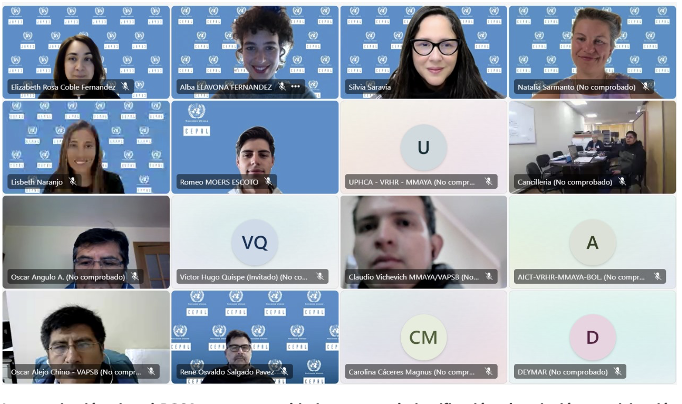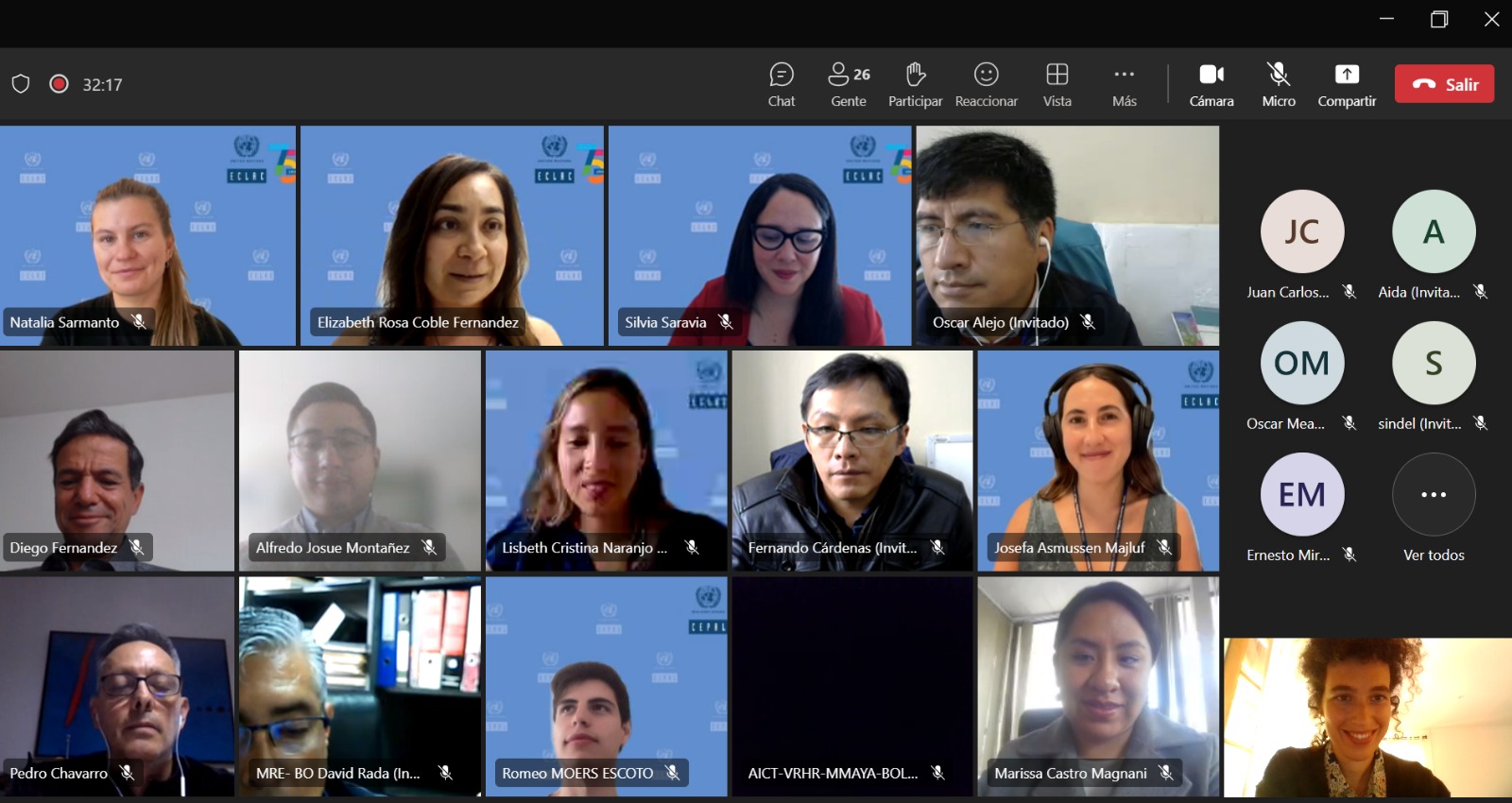ECLAC organizes the second virtual training session as part of the ROSA project's technical assistance to the Plurinational State of Bolivia: "International Processes Around Water Resources."
Work area(s)
Topic(s)
The virtual ROSA training aimed to review the justification, description, participation, and outcomes of the various international processes related to water management, including aspects relevant to the management of transboundary waters.

On Friday, August 9, 2024, the virtual training session "International Processes Around Water Resources" was held as part of the ROSA project's technical assistance to the Plurinational State of Bolivia. The session was led by Dr. Silvia Saravia Matus, Economic Affairs Officer of the Water and Energy Unit of the Natural Resources Division of ECLAC, along with the team of water resources experts from ECLAC. The event was attended by representatives of the Ministry of Foreign Affairs (MRE) and the Ministry of Environment and Water as the national counterpart.
The training began with welcoming remarks from Dr. Saravia Matus on behalf of ECLAC and from Ms. Marissa Castro, Director General of Boundaries and International Transboundary Waters of the Plurinational State of Bolivia. The training was then divided into five sessions.
The first session, led by Ms. Natalia Sarmanto, ECLAC Expert, covered international processes related to water that took place before 2010. Starting with the 1977 United Nations Water Conference as a starting point, and continuing with a series of events that provided context and laid the groundwork for countries' efforts to ensure access to drinking water and sanitation worldwide. Among them were the International Drinking Water Supply and Sanitation Decade (1981-1990), the International Conference on Water and the Environment (1992), the Earth Summit (1992), the Millennium Development Goals (MDGs) (2000), and the International Decade for Action "Water for Life" (2005-2015).
In the second session, Ms. Lisbeth Naranjo, ECLAC Expert, highlighted those international processes related to water from 2010 onward. Starting with the declaration of water and sanitation as a human right, and continuing with more recent and ongoing processes such as the 2030 Agenda and SDG 6, the SDG 6 Acceleration Framework, the Water and Sanitation Strategy (UN-Water), the International Decade for Action "Water for Sustainable Development" (2018-2028), and the 2023 United Nations Water Conference with its Water Action Agenda.
For the third session, Ms. Alba Llavona, ECLAC Expert, presented some of the main regional processes related to water, such as the Regional Water Dialogues and the regional water action agenda, the Regional Process of the Americas, the Conference of Ibero-American Water Directors and Authorities (CODIA), the High-Level Ministerial Forum, the Caribbean Water and Wastewater Association, the Central American and Dominican Republic Drinking Water and Sanitation Forum FOCARD-APS, the Andean Environmental Charter, and the Andean Regional Water Forum. Additionally, multiple examples of transboundary cooperation were provided, such as the Network of Water Authorities within the framework of the Amazon Cooperation Treaty Organization (OTCA).
Following ECLAC's presentations, the fourth session was led by representatives of the Plurinational State of Bolivia. Mr. David Rada, Head of the International Waters Unit, spoke about Bolivia's perspective and progress in transboundary water management. Then, Mr. Neftali Chapi and Ms. Beatriz Canaviri Blanco from the Ministry of Environment and Water presented details on the development process of the report for SDG 6.5.2 indicator related to transboundary water cooperation. Subsequently, Ms. Eliana Quispe Hilari, also from the Ministry of Environment and Water, gave a presentation on Bolivia's experience in managing high-altitude wetlands, citing the revitalization of bofedales (wetlands) as an example to contribute to water availability in the municipality of Charaña.
The fifth and final session was led by Dr. Saravia Matus, who, based on the previous presentations, made her presentation to connect the efforts made by the country in the various international processes with the need to strengthen the technical, operational, political, and prospective (TOPP) capacities of institutions, which are essential to enhance the effectiveness of public policies and to land how to achieve the various commitments made with the international community. She then discussed the process ECLAC has followed to identify some opportunities for these TOPP capacities. Regarding technical capacities, she highlighted opportunities to continue working on the topic of the circular economy; for operational capacities, she mentioned that current efforts could be strengthened by considering a perspective based on the United Nations water valuation principles; regarding political capacities, she pointed out that the Water Convention also provides a space to strengthen the country's current progress in transboundary water cooperation; and finally, she presented future United Nations events that provide opportunities to practice prospective exercises.
Related content

First Online Technical Assistance under the ROSA Project – Plurinational State of Bolivia
As part of the Water Sustainability Network and Observatory (ROSA) project, the first online technical assistance for the Plurinational State of Bolivia was held on February 15, 2024. This inaugural…